G. Wayne Miller's Blog, page 26
June 7, 2013
Your government spying on you
It has been an extraordinary week as London's The Guardian newspaper and The Washington Post have published top-secret documents revealing that the FBI and National Security Agency -- with the complicity and approval of Congressional intelligence committees, not to mention major U.S. corporations -- for years have been massively spying on U.S. citizens, whether suspected of criminal behavior or not.
The spying apparently extends to private telephone calls, emails, credit-card transactions, and Internet services provided by Apple, Google, Microsoft, Facebook, Skype, YouTube, Yahoo and AOL. And that's only what has come out so far.
Officials reacted with the lame observation that national security requires such erosion of privacy. Really? Secret orders from secret courts sound like... well, like George Orwell's dystopian novel 1984, as many have pointed out. It is all outrageous -- so outrageous that even the editorial board of The New York Times, which has supported President Obama on many issues, published a remarkable rebuke stating: "The administration has now lost all credibility on this issue. Mr. Obama
is proving the truism that the executive branch will use any power it
is given and very likely abuse it."
For a timeline of milestones in government surveillance since 9/11, read this excellent piece in Mother Jones.
Thank God for whistleblowers and a free press. The wisdom of the Founding Fathers in adopting the First Amendment is proved once again.
Like many other newspapers and media outlets, we at The Providence Journal will be examining this issue -- privacy v. security -- in greater detail in the weeks to come. It was already on our radar. For now, here's the local story we ran on P. 1 today alongside AP coverage of the story:
Balancing of security, rights urged
G. WAYNE MILLER
Publication Date: June 7, 2013
Page: MAIN_01
Section: News
Zone: MAIN
Edition: 1
PROVIDENCE - Disclosure that the National Security Agency is secretly
obtaining daily logs of phone calls made by Verizon customers brought a
comparison on Thursday to George Orwell's dystopian novel "1984," in
which "Big Brother" relentlessly spies on its citizens - whether they
are suspected of criminal behavior or not.
"The revelation that
the government has been secretly tracking the calls of potentially
millions of Verizon phone customers is shocking, but only the latest
example of the insidious growth of a surveillance state in this
country," Steven Brown, executive director of the Rhode Island Affiliate
of the American Civil Liberties Union, said Thursday.
"In the name of security and safety, the government is approaching Orwellian dimensions in its spying on ordinary people."
In
an interview, U.S. Sen. Jack Reed said Congress should convene hearings
into the reported surveillance and the general use of the Patriot Act,
under which the NSA apparently justified its data-gathering, with the
goal of "improvements" in the balance between Americans' right to
privacy and legitimate national security concerns.
"This is a topic that Congress should pursue," the Rhode Island Democrat said. "Hearings - absolutely."
The
revelation was published by The Guardian, a London newspaper that
obtained a copy of a top secret court order, issued two months ago by
the Foreign Intelligence Surveillance Court, a furtive U.S. government
body. The order requires Verizon Business Network Services to give the
NSA daily logs of information including the phone numbers, location data
and duration involved of all calls - regardless of whether the callers
are suspected of wrongdoing or not.
It is unknown if other U.S.
telecommunications companies, such as AT&T, are under separate
orders to supply logs to the NSA. The court order does not apply to the
content of the calls, which means the surveillance technically is not
wiretapping.
U.S. Rep. David N. Cicilline, D-R.I., was among the
members of Congress on Thursday who expressed serious concerns about
such indiscriminate surveillance.
"It is very disturbing to learn
that the National Security Agency reportedly required Verizon to turn
over information regarding the private communications of millions of
innocent Americans," Cicilline told The Providence Journal.
"The
federal government has a responsibility both to ensure our national
security and to maintain every citizen's essential right to privacy.
There has to be a better way - this level of sweeping surveillance has
no place in a free society and we should review this matter thoroughly."
Speaking
to The New York Times on Thursday, an unnamed senior official in the
Obama administration defended the gathering of phone information under a
contested section of the Patriot Act.
"Information of the sort
described in the Guardian article has been a critical tool in protecting
the nation from terrorist threats to the United States," the official
told the paper. (In a remarkable rebuke, the paper's editorial board
Thursday afternoon posted an editorial that said with the Verizon
disclosure, "the administration has now lost all credibility.")
The
"critical tool" sentiments were echoed by Daniel Castro, senior analyst
with the nonpartisan Washington, D.C.-based Information Technology
& Innovation Foundation.
"Government should use data to fight
terrorism. One of the major failures pre-9/11 was the inability to
'connect the dots,' " Castro told The Journal. "Using meta-data such as
phone records is a useful way to identify networks of individuals … .
From a privacy perspective, this is also better than listening in on
phone calls. Data analytics alone won't stop terrorism, but it should be
one tool available to law enforcement officials."
Castro, however, questioned why the surveillance had not been publicly disclosed by the government.
"Most
Americans didn't know this was happening," he said. "There's nothing
intrinsically wrong with collecting and using this type of data on a
large scale, but there doesn't seem to be a good reason to do it in
secret."
Said David Barrett, professor with Villanova University's department of political science:
"A
program which is known to high officials of the executive branch and to
the two congressional committees on intelligence is not what I would
call Big Brother. I have assumed something like this has been going on
since the passage of the Patriot Act. Notice that this particular order
does not authorize monitoring of the content of such phone calls. That
would take additional authorization."
In a statement to The Journal, U.S. Sen. Sheldon Whitehouse urged balance between security and privacy.
"As
a former member of the Senate Intelligence Committee, I can't comment
extensively on these news reports, since they relate to classified
information to which I may have been exposed," the Rhode Island Democrat
said.
"That said, when looking at programs of this nature it is
always important to ensure that our nation is protecting both civil
liberties and national security. I have always worked to make sure the
actions of our government are consistent with both goals, and I will
continue to do so."
The ACLU's Brown was more emphatic.
"This
latest disclosure highlights the need for strong action at both the
state and federal level to address these increasing encroachments on
basic privacy rights," he said.
"We can no longer pretend that
our privacy is safe from indiscriminate government snooping. We hope
that steps will be taken to restore some semblance of our right to
privacy in the face of technological advances that are so easily able to
eradicate it."
The spying apparently extends to private telephone calls, emails, credit-card transactions, and Internet services provided by Apple, Google, Microsoft, Facebook, Skype, YouTube, Yahoo and AOL. And that's only what has come out so far.
Officials reacted with the lame observation that national security requires such erosion of privacy. Really? Secret orders from secret courts sound like... well, like George Orwell's dystopian novel 1984, as many have pointed out. It is all outrageous -- so outrageous that even the editorial board of The New York Times, which has supported President Obama on many issues, published a remarkable rebuke stating: "The administration has now lost all credibility on this issue. Mr. Obama
is proving the truism that the executive branch will use any power it
is given and very likely abuse it."
For a timeline of milestones in government surveillance since 9/11, read this excellent piece in Mother Jones.
Thank God for whistleblowers and a free press. The wisdom of the Founding Fathers in adopting the First Amendment is proved once again.
Like many other newspapers and media outlets, we at The Providence Journal will be examining this issue -- privacy v. security -- in greater detail in the weeks to come. It was already on our radar. For now, here's the local story we ran on P. 1 today alongside AP coverage of the story:
Balancing of security, rights urged
G. WAYNE MILLER
Publication Date: June 7, 2013
Page: MAIN_01
Section: News
Zone: MAIN
Edition: 1
PROVIDENCE - Disclosure that the National Security Agency is secretly
obtaining daily logs of phone calls made by Verizon customers brought a
comparison on Thursday to George Orwell's dystopian novel "1984," in
which "Big Brother" relentlessly spies on its citizens - whether they
are suspected of criminal behavior or not.
"The revelation that
the government has been secretly tracking the calls of potentially
millions of Verizon phone customers is shocking, but only the latest
example of the insidious growth of a surveillance state in this
country," Steven Brown, executive director of the Rhode Island Affiliate
of the American Civil Liberties Union, said Thursday.
"In the name of security and safety, the government is approaching Orwellian dimensions in its spying on ordinary people."
In
an interview, U.S. Sen. Jack Reed said Congress should convene hearings
into the reported surveillance and the general use of the Patriot Act,
under which the NSA apparently justified its data-gathering, with the
goal of "improvements" in the balance between Americans' right to
privacy and legitimate national security concerns.
"This is a topic that Congress should pursue," the Rhode Island Democrat said. "Hearings - absolutely."
The
revelation was published by The Guardian, a London newspaper that
obtained a copy of a top secret court order, issued two months ago by
the Foreign Intelligence Surveillance Court, a furtive U.S. government
body. The order requires Verizon Business Network Services to give the
NSA daily logs of information including the phone numbers, location data
and duration involved of all calls - regardless of whether the callers
are suspected of wrongdoing or not.
It is unknown if other U.S.
telecommunications companies, such as AT&T, are under separate
orders to supply logs to the NSA. The court order does not apply to the
content of the calls, which means the surveillance technically is not
wiretapping.
U.S. Rep. David N. Cicilline, D-R.I., was among the
members of Congress on Thursday who expressed serious concerns about
such indiscriminate surveillance.
"It is very disturbing to learn
that the National Security Agency reportedly required Verizon to turn
over information regarding the private communications of millions of
innocent Americans," Cicilline told The Providence Journal.
"The
federal government has a responsibility both to ensure our national
security and to maintain every citizen's essential right to privacy.
There has to be a better way - this level of sweeping surveillance has
no place in a free society and we should review this matter thoroughly."
Speaking
to The New York Times on Thursday, an unnamed senior official in the
Obama administration defended the gathering of phone information under a
contested section of the Patriot Act.
"Information of the sort
described in the Guardian article has been a critical tool in protecting
the nation from terrorist threats to the United States," the official
told the paper. (In a remarkable rebuke, the paper's editorial board
Thursday afternoon posted an editorial that said with the Verizon
disclosure, "the administration has now lost all credibility.")
The
"critical tool" sentiments were echoed by Daniel Castro, senior analyst
with the nonpartisan Washington, D.C.-based Information Technology
& Innovation Foundation.
"Government should use data to fight
terrorism. One of the major failures pre-9/11 was the inability to
'connect the dots,' " Castro told The Journal. "Using meta-data such as
phone records is a useful way to identify networks of individuals … .
From a privacy perspective, this is also better than listening in on
phone calls. Data analytics alone won't stop terrorism, but it should be
one tool available to law enforcement officials."
Castro, however, questioned why the surveillance had not been publicly disclosed by the government.
"Most
Americans didn't know this was happening," he said. "There's nothing
intrinsically wrong with collecting and using this type of data on a
large scale, but there doesn't seem to be a good reason to do it in
secret."
Said David Barrett, professor with Villanova University's department of political science:
"A
program which is known to high officials of the executive branch and to
the two congressional committees on intelligence is not what I would
call Big Brother. I have assumed something like this has been going on
since the passage of the Patriot Act. Notice that this particular order
does not authorize monitoring of the content of such phone calls. That
would take additional authorization."
In a statement to The Journal, U.S. Sen. Sheldon Whitehouse urged balance between security and privacy.
"As
a former member of the Senate Intelligence Committee, I can't comment
extensively on these news reports, since they relate to classified
information to which I may have been exposed," the Rhode Island Democrat
said.
"That said, when looking at programs of this nature it is
always important to ensure that our nation is protecting both civil
liberties and national security. I have always worked to make sure the
actions of our government are consistent with both goals, and I will
continue to do so."
The ACLU's Brown was more emphatic.
"This
latest disclosure highlights the need for strong action at both the
state and federal level to address these increasing encroachments on
basic privacy rights," he said.
"We can no longer pretend that
our privacy is safe from indiscriminate government snooping. We hope
that steps will be taken to restore some semblance of our right to
privacy in the face of technological advances that are so easily able to
eradicate it."
Published on June 07, 2013 06:55
June 4, 2013
"Vapors," v. 2 of the collected short stories, soon to be published
Updated, refreshed, edited and otherwise made ready for publication (and republication), a second set of my collected short stories is soon to appear in
Vapors, The Essential G. Wayne Miller Fiction, Vol 2
. And once again, designer David Dodd, of publisher Crossroad Press, has knocked it out of the park. Check out this cover. I'll post the link to Kindle when it goes up, but meanwhile, Since the Sky Blew Off, Vol 1 in the collected stories, may be of interest. A similar mix of horror, sci-fi, mystery and crime.
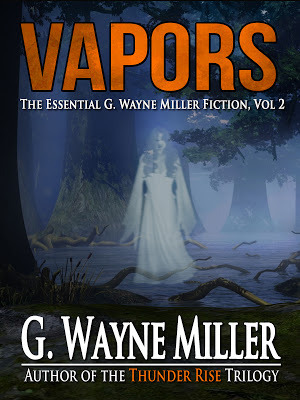
Another great David Dodd cover! This dude's got it, folks.

Another great David Dodd cover! This dude's got it, folks.
Published on June 04, 2013 08:34
May 31, 2013
Bob Whitcomb retires from Providence Journal
After 43 years in journalism -- 32 of them at The Providence Journal -- Bob Whitcomb retired today as vice president and editor of the editorial pages. He will be missed here at 75 Fountain Street -- but we will be seeing him in many other places (and on the op-ed pages) as he continues with his writing. And also at Salve Regina Univerity's Pell Center, where he will be an adjunct fellow. He already is a governor with The Pell Center's Story in the Public Square program.
I have known Bob since 1981, when I arrived at the projo and he was soon to depart for Paris, where he became an
editor for the International Herald Tribune. Five years later, he came back. Best of luck, Bob! Ed Achorn is replacing Bob, as
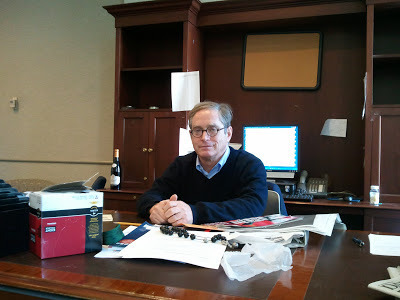
Bob Whitcomb in his fourth-floor office, May 31, 2013.
Here is the story about Bob that my colleague Tom Mooney wrote for last Sunday's paper:
Media | Editorial page editor to retire but will write column
TOM MOONEY
Publication Date: May 26, 2013
Page: MAIN_06
Section: News
Zone: MAIN
Edition: 1
PROVIDENCE - Robert B. Whitcomb, the erudite and good-humored editorial
pages editor for The Providence Journal for the last 21 years and one of
the newspaper's vice presidents, is retiring at the end of this month.
Whitcomb,
65, said he is stepping down now to "try other things." One of them
will be as a regular guest contributor on the editorial pages that he
has overseen - writing a column every other week on "a wide range of
topics representing my existential angst."
Whitcomb, who worked
for 32 years at The Journal, has been a vice president at the newspaper
since 1997 and in charge of its editorial pages since 1992.
"Bob
Whitcomb has had a stellar 43-year career in journalism," said Howard G.
Sutton, publisher, president and chief executive officer of The
Providence Journal Co. "For the last 21 years he has produced some of
the finest editorial pages in the country for The Providence Journal.
"He
leaves behind a sterling record of service to the newspaper and to
Southern New England, as an advocate for better government, a fan of
alternative energy, a strong supporter for economic development and a
skeptic of big business."
Whitcomb first joined The Journal in
1976 after writing and editing stints at the Boston Herald Traveler, the
Wilmington (Del.) News Journal and The Wall Street Journal, in New
York. He left The Providence Journal at the end of 1982 to become an
editor for the International Herald Tribune, based in Paris, and
returned to The Journal in 1987, serving as acting Sunday managing
editor before moving upstairs in 1989 to begin writing editorials.
Whitcomb championed having a wide range of voices on the editorial and opinion pages.
"I'm not one who believes a paper like this should have just local
news," he said in a recent interview. "It should give you a view of the
world. And not just from where you are sitting."
Whitcomb has had
a ringside seat to revolutionary changes in the media in recent years
as more people turn to news online. Besides the reduction of reporters
gathering the news and asking questions, "the most distressing thing to
me," Whitcomb said, has been "the triumph of process over content which
permeates most of the media now," the emphasis of story display over
proper writing and editing.
"I think in the next five years, we
will kind of reinvent ourselves…. In the interim I worry about quality
journalism. You can see the effect, the decline in civic discourse in
civil society."
But reality being what it is, Whitcomb said, "it's like complaining that rocks are hard."
Whitcomb,
a 1970 Dartmouth College graduate, co-authored a book in 2008 about the
various interests surrounding the Cape Cod wind farm project. He says
he has a couple of other writing projects in mind, including perhaps
another book, historical in nature.
He also plans to help a friend who is making a documentary about the OSS, the predecessor to the CIA.
Whitcomb and his wife, Nancy, live in Providence and have two adult daughters.
"I
have a very strong sense of clocks, of running out of time," Whitcomb
said. "A lot of people in my family have died pretty young, so I think
about that and think about having enough time to try other things. I
will miss some of the absurdities of this business, some of the humor,
the craziness, the unpredictability…. But like everyone in the business,
five minutes after I leave, everyone will forget that I was here. So
there is a wonderful transient nature to this business."
I have known Bob since 1981, when I arrived at the projo and he was soon to depart for Paris, where he became an
editor for the International Herald Tribune. Five years later, he came back. Best of luck, Bob! Ed Achorn is replacing Bob, as

Bob Whitcomb in his fourth-floor office, May 31, 2013.
Here is the story about Bob that my colleague Tom Mooney wrote for last Sunday's paper:
Media | Editorial page editor to retire but will write column
TOM MOONEY
Publication Date: May 26, 2013
Page: MAIN_06
Section: News
Zone: MAIN
Edition: 1
PROVIDENCE - Robert B. Whitcomb, the erudite and good-humored editorial
pages editor for The Providence Journal for the last 21 years and one of
the newspaper's vice presidents, is retiring at the end of this month.
Whitcomb,
65, said he is stepping down now to "try other things." One of them
will be as a regular guest contributor on the editorial pages that he
has overseen - writing a column every other week on "a wide range of
topics representing my existential angst."
Whitcomb, who worked
for 32 years at The Journal, has been a vice president at the newspaper
since 1997 and in charge of its editorial pages since 1992.
"Bob
Whitcomb has had a stellar 43-year career in journalism," said Howard G.
Sutton, publisher, president and chief executive officer of The
Providence Journal Co. "For the last 21 years he has produced some of
the finest editorial pages in the country for The Providence Journal.
"He
leaves behind a sterling record of service to the newspaper and to
Southern New England, as an advocate for better government, a fan of
alternative energy, a strong supporter for economic development and a
skeptic of big business."
Whitcomb first joined The Journal in
1976 after writing and editing stints at the Boston Herald Traveler, the
Wilmington (Del.) News Journal and The Wall Street Journal, in New
York. He left The Providence Journal at the end of 1982 to become an
editor for the International Herald Tribune, based in Paris, and
returned to The Journal in 1987, serving as acting Sunday managing
editor before moving upstairs in 1989 to begin writing editorials.
Whitcomb championed having a wide range of voices on the editorial and opinion pages.
"I'm not one who believes a paper like this should have just local
news," he said in a recent interview. "It should give you a view of the
world. And not just from where you are sitting."
Whitcomb has had
a ringside seat to revolutionary changes in the media in recent years
as more people turn to news online. Besides the reduction of reporters
gathering the news and asking questions, "the most distressing thing to
me," Whitcomb said, has been "the triumph of process over content which
permeates most of the media now," the emphasis of story display over
proper writing and editing.
"I think in the next five years, we
will kind of reinvent ourselves…. In the interim I worry about quality
journalism. You can see the effect, the decline in civic discourse in
civil society."
But reality being what it is, Whitcomb said, "it's like complaining that rocks are hard."
Whitcomb,
a 1970 Dartmouth College graduate, co-authored a book in 2008 about the
various interests surrounding the Cape Cod wind farm project. He says
he has a couple of other writing projects in mind, including perhaps
another book, historical in nature.
He also plans to help a friend who is making a documentary about the OSS, the predecessor to the CIA.
Whitcomb and his wife, Nancy, live in Providence and have two adult daughters.
"I
have a very strong sense of clocks, of running out of time," Whitcomb
said. "A lot of people in my family have died pretty young, so I think
about that and think about having enough time to try other things. I
will miss some of the absurdities of this business, some of the humor,
the craziness, the unpredictability…. But like everyone in the business,
five minutes after I leave, everyone will forget that I was here. So
there is a wonderful transient nature to this business."
Published on May 31, 2013 08:31
May 23, 2013
Short story "All My Children" and interview on new Blackout City/Dark Dreams podcast
Horror aficionado and entrepreneur Mark Slade has brought a second short story from the Since the Sky Blew Off collection to podcast. Following on the heels of the fine narration of "We Who are His Followers" comes the 'cast of "All My Children," a horror/crime tale.
Listen to the podcast at Mark's Blackout City page. "All My Children" starts at the 14:45 mark of Episode 3: Darkness and Light.
"Stalking G. Wayne Miller," an interview Mark conducted with me is also on the same Blackout City page. We talk about many things, but mostly writing -- some good advice for young writers trying to break in, as I myself was many years ago as I was starting out. I know that rough road well!
"We Who are His Followers" can be heard at Mark's Dark Dreams podcast site. Starts at the 10:08 mark.
As Mark and the folks at Crossroad Press bring more of my short- and long-form fiction to new audiences, I am drawn to my archives -- to the magazines in which some of my short stories originally appeared. While I believe it has stood the test of time, "All My Children" was first published in 1988 in Violent Legends, a magazine published by writer and poet Joey Froehlich. For a glimpse into what things were like back then, before the Internet, when I was trying to break through -- young writers today, take note! -- look at the cover of that issue, and the first page of my story as it appeared. I do not recall if this was the only issue ever published, and I have tried without success to track Joey down. If you're out there, man, please drop me a line!
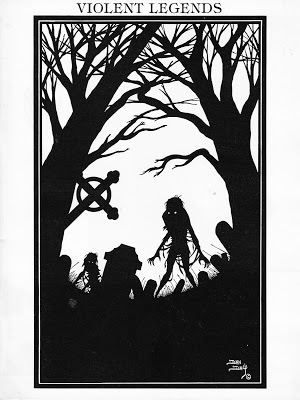
The cover of Violent Legends, horror zine in 1988.
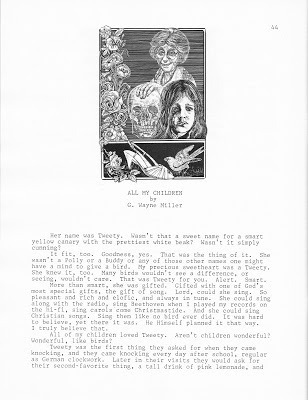
First page of my story. It was typed!
Published on May 23, 2013 15:34
Short story "All My Children" and interview on new Blackout City Podcast
Horror aficionado and entrepreneur Mark Slade has brought a second short story from the Since the Sky Blew Off collection to podcast. Following on the heels of the fine narration of "We Who are His Followers" comes the 'cast of "All My Children," a horror/crime tale.
Listen to the podcast at Mark's Blackout City page. "All My Children" starts at the 14:45 mark of Episode 3: Darkness and Light.
"Stalking G. Wayne Miller," an interview Mark conducted with me is also on the same Blackout City page. We talk about many things, but mostly writing -- some good advice for young writers trying to break in, as I myself was many years ago as I was starting out. I know that rough road well!
"We Who are His Followers" can be heard at Mark's Dark Dreams podcast site. Starts at the 10:08 mark.
As Mark and the folks at Crossroad Press bring more of my short- and long-form fiction to new audiences, I am drawn to my archives -- to the magazines in which some of my short stories originally appeared. While I believe it has stood the test of time, "All My Children" was first published in 1988 in Violent Legends, a magazine published by writer and poet Joey Froehlich. For a glimpse into what things were like back then, before the Internet, when I was trying to break through -- young writers today, take note! -- look at the cover of that issue, and the first page of my story as it appeared. I do not recall if this was the only issue ever published, and I have tried without success to track Joey down. If you're out there, man, please drop me a line!

The cover of Violent Legends, horror zine in 1988.

First page of my story. It was typed!
Published on May 23, 2013 15:34
Vote now! Help choose the title of my next short story collection.
Once we settle on the cover art, my good friends at Crossroad Press will be publishing the second volume of my collected short stories, a year after they brought out the first, SINCE THE SKY BLEW OFF.
And I'd like your help in choosing the title. Here are your choices:
-- VAPORS
or
-- NOTHING THERE
Each is also the name of a story that will be included in the collection. Please cast your vote on my Facebook page, or send me an email.
It's not necessary to read either story to vote, nor even to know the genres -- in fact, I am hoping for your immediate, instinctive response. Which rings better to your ear: Vapors or Nothing There?
For the record, these are horror, mystery and sci-fi stories, like those in SKY.
If you would like to read "Vapors," however, follow this link.
And if you'd like to read "Nothing There," originally published in the late David Silva's legendary 1980s and '90s magazine The Horror Show, scroll down past the original art that appeared with the story. Illustration © copyright 1987 Chris Pelletiere.
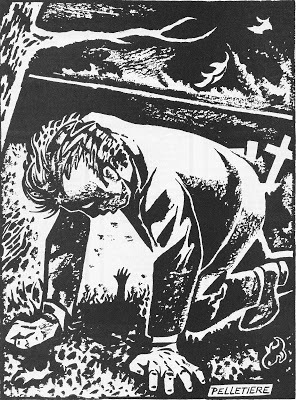
Nothing There
© copyright 1987 and 2013 G. Wayne Miller
He drove north from Chicago in a rented Honda.
The Saturday afternoon traffic was thick and sluggish, like blood through
diseased arteries. How polite these drivers seemed. Back in Boston, you
couldn't go a block without some idiot trying to nail you. Here, folks signaled
when passing. They stayed close to the speed limit. No one tailgated. He
supposed it was part of their Midwestern nature to be so courteous. He wondered
momentarily what kind of world it would be if everyone were like them.
Before long, the factories and tenements
had thinned and then disappeared. The jets in and out of O'Hare had shrunk to
distant specks. He passed an amusement park, closed for the season. He saw
transmission lines coming down from Canada. It was suburbia now, 7-11 stores
and neat little lawns fronting neat little houses. Soon they, too, had faded.
Farmhouses took their place. Cornfields and dairy cattle. Silos, rigid and
tall, guardians of this rich black soil. He crossed the line and he was in
Wisconsin. From here, she'd said, it was only another half hour.
The traffic was weaker now. The November
day was, too. High, thin clouds spread across the measureless sky. Another
hour, and the sun would be swallowed by the fields. At kitchen tables, dinner
would be served. He imagined seeing aproned housewives, their hair done up in
curlers and kerchiefs, bending over ovens where hamburger casseroles simmered.
He imagined hearing the children, giddy with the thought of Saturday night, and
the tired husbands, ready for their evening of rest.
Overhead, the sign said County K, one mile.
What a funny name for a road, he thought. County K, like some new brand of
cereal. He looked down at the directions he'd scribbled on hotel stationery.
Yes, this was it. He eased over into the travel lane, slowed and left
Interstate 94. There was the 76 truck stop, just as she'd said. A combination
restaurant, gift shop and Greyhound bus stop. A parking lot full of full-sized
Fords and Chryslers, with hardly a Toyota in sight. The heartland.
He'd called her after lunch from his hotel
room. The first few minutes had been awkward for them both. He could hear the
sounds of kids in the background. He told her about his convention. She talked
about the weather, unseasonably mild, and unlikely to last, considering
Thanksgiving was just around the corner.
``Where are you staying?'' she'd asked.
``The Palmer House.''
``Very fancy.''
``It's OK.''
``No, it's fancy,'' she insisted. ``I've
been there. Window- shopping in that big lobby.''
``They have some nice shops.''
``You've done all right for yourself, John,''
she said, trying to mask her bitterness. A trace still showed. ``You always
did.''
He didn't answer. Didn't know what he could
have said if he'd tried.
``So how'd you find me?'' she asked after
shouting at the children to be quiet, Mommy's got a very special call.
``The alumni office.'' They'd been the same
class, the class of '96. He'd gone back east after graduation. She'd gone home
to Wisconsin, never expecting to hear from him again.
``It's funny.''
``What?''
``That you tracked me down. I tried to find
you, you know.''
He didn't. But it didn't surprise him.
There was a time he'd actually dreaded her call, but that had passed. During
the period he was married, he'd almost forgotten her. It wasn't until after his
divorce that he'd thought much about her again.
``I tried several times, as a matter of
fact,'' she continued. ``I wrote letters. They kept coming back.''
``I've moved a lot,'' he said. ``The
company.''
``It doesn't matter now.''
There was another pause. The words weren't
coming easily from either of them.
``I'm divorced, you know,'' she said after
a bit.
``I know. I am, too.''
``I've got two children. That's who you
hear running around. A boy and a girl.''
``I know,'' he repeated dumbly.
``You seem to have done your homework,'' she
said, and he couldn't tell if she was mad or not.
``It's all on record at the alumni
office,'' he explained. ``Anyone can get it by calling.''
``Did they tell you they were both
adopted?'' she asked.
``No.''
``After Bryce, I couldn't have children. Of
my own.''
Bryce, he thought. So that's what she called him. Why did she even bother to name him?
What could it matter?
``I'm sorry,'' he said. He wished he had a
glass of water to get rid of the dryness in his mouth.
``I am, too.'' He was surprised at how cold
her voice had turned. How suddenly. He didn't remember her like that. He
remembered her as soft, pretty, the youngest-looking girl sitting at the back
of Economics 101 the morning he first set eyes on her.
``I'm really sorry.''
``Sure.''
There was silence again. It was a bad cell,
and he could hear static through the phone.
The child had been stillborn. That much
he'd heard years ago from a friend of a friend of a friend. There had been whispers
of some horrible deformity, but he'd never been able to confirm that, never
bothered to try. What would have been the gain? What was done was done. All he
knew for sure was that Sheryl had carried the baby to term, and he'd come out
blue and unbreathing. There was a question of medical malpractice. As far as he
knew, it had never come to a suit. That wouldn't have been like her. This had
all happened that September, three months after he'd said goodbye.
``So why'd you call, John?'' she asked,
breaking the silence.
He'd been ready for this one, but he still
didn't have a good answer. Just some private feelings he couldn't share because
he wasn't sure what they meant, if they meant anything at all.
``I just thought I should,'' he said.
``I've been thinking about it for a long time.''
``Do you want to see him?'' she asked. ``I
think you should see him. Just once. It wouldn't have to be for long.''
He had no idea what she was talking about.
``Who?''
``Bryce. His grave, I mean.''
What a strange idea, he thought. Perverse.
Again, the pause was long, uncomfortable. He wished desperately that the call
was over, but he saw no way of ending it. It was up to her now.
``I could tell you how to get there. It's
not even two hours from Chicago.''
``I--''
``I think you should, John,'' she said
sternly. ``I think you owe him at least that. Him and me. Respect for the
memory. Respect for the past.''
``Yes,'' he finally said. ``I'd like to.''
She gave him directions. He was reading
them again now after stopping at the restaurant to use the men's room. County K
six miles west to an intersection. Right on Rowe's Lane about a mile to a seed
farm. The cemetery would be just over the next knoll. You can't miss it, she'd
said. It's on the highest land around.
He rolled the window down and put the car
in gear.
Night wasn't far off, but it seemed to have
warmed up since leaving Chicago. The air on his face felt refreshing, like a
shower after a bad night's sleep. For some reason, he'd been getting
increasingly anxious the last few miles. Strung out. He could feel the excess
nervous energy running up and down his body. It was like having too many cups
of coffee. His palms were actually sweaty. For the first time since talking to
her, he wondered what exactly he'd gotten himself into, and why. He didn't have
the answers. That bothered him more than anything. He'd gotten where he had in
business by coming up with answers.
County K, a two-lane blacktop, wound off
toward the setting sun. There was almost no traffic, only an occasional tractor
or pickup truck or stainless-steel tanker carrying milk destined to become
butter or cheese. The only buildings were farmhouses and barns. It seemed
everyone was flying an American flag. In the Ivy-League East, patriotism
smacked too much of Tea Party politics to be worn on the sleeve. Here, it fit.
He found the cemetery without any trouble.
From this knoll, you could see for miles and miles over the rolling
countryside. It reminded him of a Grandma Moses painting, the fields and
outbuildings arranged like patchwork.
He got out of the car and paused a moment,
surveying the cemetery.
It was unexpectedly tiny, a postage stamp
of graveyards. The only smaller one he recalled ever seeing was one near
Concord, Mass., where a handful of Revolutionary War heroes were buried
together under white headstones whose inscriptions had worn off over the years.
He counted, unconsciously using his finger as a measure. There couldn't be more
than a dozen families buried here. One of them was hers, the Andersens. He
remembered her telling the story of how the family had come over from Sweden
during the great wave of Scandinavian immigration a century ago. They'd been
carpenters and masons, these Andersens, and they'd done all right for
themselves in the New Land.
The wind had picked up since the truck stop
and it was insistent now, brisk but not harsh. In a few short weeks it would
deliver the sleet and the snow, but today, on the cusp of fall, it brought only
a final reminder of summer. In great sheets, it came whipping across the flat landscape,
fragrant with a sweet agricultural odor he did not recognize. He stood, letting
the wind caress him. He looked out over the stones, the torn veterans' flags,
potted geraniums wilted by the autumn's first frost. The cemetery was
surrounded by fields. They were brown, their life gone silently underground to
await a more encouraging season.
The heartland. He'd probably eaten food
grown around here, maybe from one of these very fields.
Carrying the green bag he'd picked up in the
Palmer House lobby, he opened the rusted iron gate and walked uncertainly into
the cemetery. That shaky feeling had returned. His lips were dry. He felt
suddenly alone, inexplicably embarrassed, like the man in the dream who finds
himself in public without any clothes. Let's get it over with and get out of
here, he thought. He went directly to the Andersen plot, past the Birds, the
Bergmans, the Mondales, the Thompsons. The featured Andersen stone was a
towering obelisk, at least twice his height, cut from what appeared to be gray
marble, polished and mirror-smooth. The shadow from a leafless tree fell across
it in an abstract pattern. Somebody had paid a small fortune for this display,
he could tell that. He remembered her father, Ambrose Andersen, a tall, stern
man he'd met once. Andersen had made a small fortune in construction, and like
many newly wealthy people, he enjoyed spending. He'd probably footed the bill.
Laid out in front of the obelisk were
perhaps 25 flat stones, each roughly the size of a hardcover dictionary. All
that had been inscribed on any of them were names and the two most important
years in anyone's existence. ``Mother, 1845-1912.'' ``Father, 1840-1905.''
``Henry, 1884-1944,'' and so forth. On the extreme left-hand perimeter of the
Andersen territory, almost into the Birds', was the stone he was looking for.
``Baby Bryce,'' it read, ``1996-1996.''
He opened the green bag and laid what was
in it, a single white rose, atop the stone. His fingers were clumsy, his breath
more labored than it should have been. He didn't have any of the thoughts he
had expected would be haunting him right now; maybe they would come on the
return trip to Chicago, or the plane home tomorrow to Boston. Nothing about
what might have been, how he might have been playing Little League baseball,
what he might have looked like, what his favorite subject in school might have
been. None of that. Only a nagging sensation of having done wrong, and never
being able to make contrition, even if he wanted to.
He didn't hear the pickup. Didn't see her
approach from the field.
When he looked up, she was there, barely 20
feet away.
He looked at her, startled initially. Time
had gotten to her. It had to him, too, he couldn't kid himself. She looked
unkempt, haggard, as if she never got enough sleep any more. Her clothes looked
freshly laundered but worn, as if she'd had them too long. For an instant,
their eyes locked. It was impossible to say what was exchanged between them in
that moment. Recognition, but more. Loneliness. A glimmer of what might have
been, perhaps. A rush of memories, none well defined. Then it was gone. Her
eyes went as cold as the gathering evening. There was nothing to say.
She came closer. He didn't move. He hadn't
expected it to play out like this.
They embraced. For his part, it was
instinctive. Reflexive. There was no more thought to it than drawing a breath.
She was warm, her breath intoxicating. Through her coat, he could feel the
swell of her breasts. Suddenly, the memories had taken on sharp definition. Now
he remembered them making love the first time, the way he'd eased inside her,
the softly building passion that had finally exploded one Saturday evening when
his roommate was away.
He didn't see her knife.
She plunged it into the back of his neck.
The first blood fell in perfect splatters
on Baby Bryce's stone, like drops of wax from a flaming red candle. It was only
a surface wound, calculated and deliberate. Alone, it might have stopped
bleeding. He wasn't even sure at first that he'd been stabbed. He thought maybe
she'd dug her fingernails into him. The tenderness he'd started to feel escaped
him like steam. He was tempted to slap her. He'd never wanted to hit a woman
before. He did now. Self-defense. But he didn't. He turned, headed for the car.
A trickle of warmth ran down the inside of his shirt. The crazy fucker.
She roared toward him, her cutting arm a
scythe of blurred motion. This time he saw the blade. It was a pocket knife,
the kind young punks smuggle into school. The blade couldn't have been four
inches long. In that instant of confused terror, he remembered something his
mother had told him as a kid. It wasn't about knives. It was about drowning.
You can drown anywhere there's water, she'd said. Even in your own bathtub,
even in an inch of water.
This time, she connected only once, a long,
violent gash that sliced through his coat sleeve into his forearm. The fabric
was quickly moist from the inside out. The pain was immense. She meant to kill
him. It was like being kicked in the stomach, realizing that, but he knew it
was true. He was suddenly breathless, fevered. With his good arm, he grabbed
his wounded one, holding it fiercely, as if that would stop the bleeding. She
came at him again. For a second, he saw her eyes. There was nothing there but
emptiness. He ducked to one side, and she charged past him, almost falling.
He hesitated. For a second, he thought of
fighting back. He was bigger than she, stronger. And she was out of her mind, a
crazed psychotic with a knife. He looked wildly around, but there was nothing
he could use as a weapon, no branch or loose rock. The best bet was to get the
hell away. The bleeding wasn't bad, but he'd have to see a doctor. Then he
would go to the police and have the crazy fucker arrested. That's what he was
going to do, goddamn it. Have her put behind bars for good.
He took a step, a step that brought his
foot into contact with Baby Bryce's stone.
He felt something lock around his ankle.
Tiny, vice-like.
He looked down. There was nothing there, of
course, only grass and that flat polished marble stone, blending into the
shadows of approaching evening. He could taste bile as his panic rose.
He tried to move.
He was locked in place.
``What the--''
She was back, blade whistling. Her aim was
more precise than before. He saw the knife, heard it, tried to roll out of its
trajectory, but his foot was stuck. He did the best he could, twisting and
squirming to one side. It was not enough.
She made contact, again and again. His
shoulder. His side. His thigh. His right hand. He felt each cut. None was
deeper than tendon level. It was more like being pricked with a needle or stung
by hornets than being stabbed. After each cut, the warm moisture. Death by a
thousand cuts.
His ankle.
He grabbed at it, like a
mink caught in a leg hold trap. There was nothing there, of course. With his
other hand, he tried frantically to fend her off. She was nimble. She seemed
able to anticipate him, dodging when he lashed out, closing back in when he
tried unsuccessfully to get to his feet.
Maybe he could crawl. In his panic, that
new thought was delightful. It was like being born again. He was on his belly
and maybe he could crawl. Maybe he'd broken his ankle, that was all, and he
could slither away from her.
But he couldn't crawl, not more than a few
inches. His foot was frozen.
She was in no hurry. There was still plenty
of daylight remaining, 15 minutes or more until blackness settled over them.
She was nicking him. Little flicks of cuts, counting toward a thousand. It was
uncanny how she kept missing all the major arteries and organs, the ones that
would have ended it quickly. She seemed to know anatomy, seemed to have studied
it until she was sure what to hit, what to avoid. He was bleeding everywhere
but gushing nowhere. His central nervous system only gradually was shifting
into shock.
The pain was building. Soon it was too big
for screaming. He began to moan. A mortally wounded animal sound, back through
the millennia to when ancestors walked on all fours. Hunter and prey. Victor
and vanquished.
His vision blurred.
As consciousness drained away to
nothingness, he thought he saw her.
Smiling, her face inches from his.
He thought he heard a new sound.
The sound of a newborn crying.
The sound of birth.
Published on May 23, 2013 05:28
May 7, 2013
Audible potpouri
More of my writing, new and old, keeps finding its way into additional formats. Previous publishers are issuing new e-editions, and my partners today at the multi-platform, multi-genre Crossroad Press have joined in that effort -- with books and stories that span my professional career, from old to brand-new, notably the finally completed Thunder Rise trilogy of horror/mystery novels and Since the Sky Blew Off, first of a planned three volumes of my horror/mystery/sci-fi short stories. (Read "The Beach That Summer," from the forthcoming v. 2, Vapors.)
Now come the audio (and video) productions, of various works, from multiple sources:
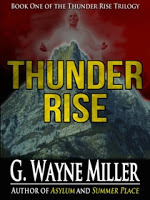
Thunder Rise, first in the trilogy (with Asylum and Summer Place, is now an audible book.
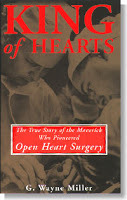
The earlier audible version of King of Hearts, from Random House, remains available.
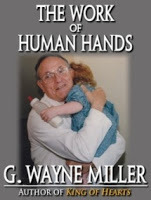
Also now on audible is The Work of Human Hands, my first non-fiction book. .
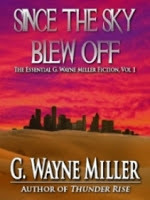
A podcast of "We Who Are His Followers," from the Sky collection, is now available as a podcast (starts at 10:08 mark) from Mark Slade's Dark Dreams. More stories will be available on Dark Dreams soon.

A podcast about Toy Wars and G.I. Joe on JoeDeclassified: Special Ops went up in January 2013.
And you can watch an interview with me on writing from a few years ago, by my son, Calvin.
Now come the audio (and video) productions, of various works, from multiple sources:

Thunder Rise, first in the trilogy (with Asylum and Summer Place, is now an audible book.

The earlier audible version of King of Hearts, from Random House, remains available.

Also now on audible is The Work of Human Hands, my first non-fiction book. .

A podcast of "We Who Are His Followers," from the Sky collection, is now available as a podcast (starts at 10:08 mark) from Mark Slade's Dark Dreams. More stories will be available on Dark Dreams soon.

A podcast about Toy Wars and G.I. Joe on JoeDeclassified: Special Ops went up in January 2013.
And you can watch an interview with me on writing from a few years ago, by my son, Calvin.
Published on May 07, 2013 12:01
May 2, 2013
The Thunder Rise trilogy, finis!
In 1989, when William Morrow published my first book, the horror/mystery novel
Thunder Rise,
I envisioned it as the first in a trilogy set in the area around a fictional mountain in real-life Berkshire County, Massachusetts. In the last few months, I have completed writing the last two.
And thanks to my good friends at Crossroad Press, Asylum and Summer Place are now in print and Thunder Rise is also an audio book. Details on all editions of the three books are at my books page -- along with details about Since The Sky Blew Off, the first volume, of a planned three, of my collected horror/mystery/sci-fi stories, some previously published, some now for the first time. (Read The Beach That Summer, from Vapors, the upcoming Volume 2.)
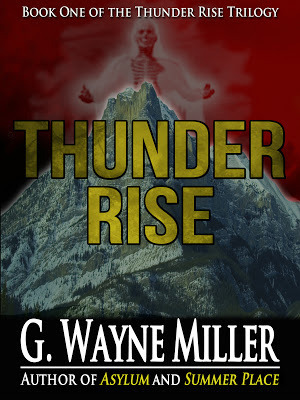
The beginning of the saga. In e-editions and now also an audio book.
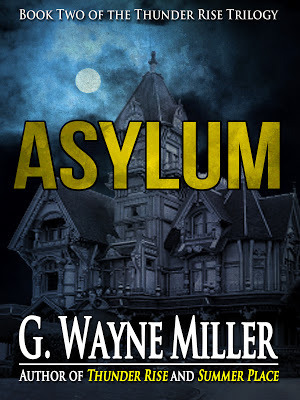
Second in the Thunder Rise trilogy. Proceeds will benefit patients at Zambarano Hospital, in memory of my dear friend Frank Beazley.
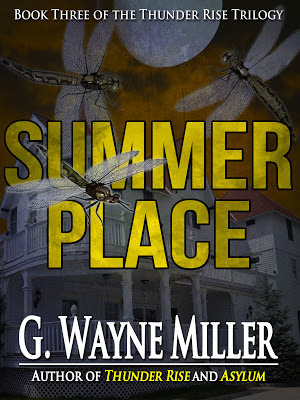
The final book in the trilogy. A Kindle exclusive.
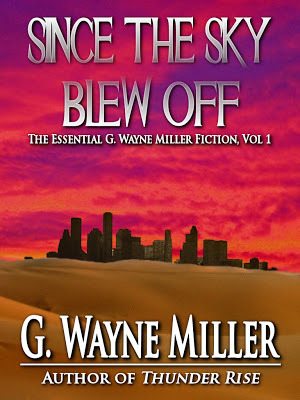
Dystopia, Apocalypse and more, available on multiple platforms.
And thanks to my good friends at Crossroad Press, Asylum and Summer Place are now in print and Thunder Rise is also an audio book. Details on all editions of the three books are at my books page -- along with details about Since The Sky Blew Off, the first volume, of a planned three, of my collected horror/mystery/sci-fi stories, some previously published, some now for the first time. (Read The Beach That Summer, from Vapors, the upcoming Volume 2.)

The beginning of the saga. In e-editions and now also an audio book.

Second in the Thunder Rise trilogy. Proceeds will benefit patients at Zambarano Hospital, in memory of my dear friend Frank Beazley.

The final book in the trilogy. A Kindle exclusive.

Dystopia, Apocalypse and more, available on multiple platforms.
Published on May 02, 2013 03:00
The Beach That Summer
THE BEACH THAT
SUMMER
copyright 2013 www.gwaynemiller.com
(From Vapors, the upcoming v. 2 of my collected short stories, companion to the Thunder Rise trilogy)
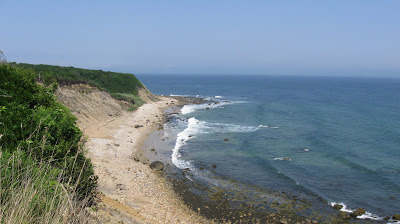
That summer,
Sand Hill was overrun by crazies. Try as you might, you couldn't get away from
them -- not at the beach, not in the bars, not even in your own backyard.
I don't mean the
summer people, the Applebaums and Lodges, the Bloomfields and Morgans. They
came that summer, as always, but they stayed even more to themselves inside
their Victorians and Capes. I don't know how many installed burglar alarms or
hired guards or took up arms, but I guarantee you there were a lot.
No, they were a
new breed, strangers to oldtime islanders like me. Out-of-towners, drawn by the
big-city papers and the checkout-counter tabloids and that big story on network
news the day before the Fourth of July. Just for fun, I stood on the bridge one
morning and checked license plates. It's a two-lane job, and both those lanes
were busy the hour I was there. Maine, Massachusetts, New Hampshire,
Connecticut, a few New Yorks, a couple of Ohios, even a California -- that's
what I saw. I don't claim every one of them was drawn by what was going on, but
I'd bet you a shore dinner most were.
We had gorgeous
weather that summer, absolutely picture- postcard perfect the whole way
through, and that didn't help, either. Come Labor Day, an islander -- a sailor
whose business it is to know such things -- counted the rainy days and came up
with a total of five. Even the thunderstorms stayed away that summer.
Of course, the
crazies would've come anyway, fair weather or foul. I knew that. Most every
islander knew that. The authorities knew it, too, and the frustration of it
nearly drove them mad.
See, there was a
crackle in the air that summer on Sand Hill. A tension you couldn't hide from.
A tension that was strongest out on West Shore, where all of them were found.
*****
Paula Hempson
was first. I knew Paula -- about as well as anyone else, I guess, and that was
none too well at all.
She was a loner
-- a seamstress by trade but a drinker by profession, an overweight woman about
my age, 47, who lived with a couple of strays in a trailer out by the landfill.
Once in a blue moon you'd see her at Jake's Cafe, swilling beers alone at the
end of the bar, clothes unkempt and hair dirty, looking for all the world like
somebody who'd just poisoned her overbearing mother.
June 8, they
found her body -- what was left of it -- on a tidal flat off West Shore.
West Shore is
the island's scenic gem, three miles of beautiful white sand that belongs in
Florida or South Carolina or Hawaii, not southern New England. Three miles of
clean, virgin beach, not a hot dog stand or a windsurfing shop in sight. State
land, the only reason it's stayed undeveloped for so long.
West Shore --
since I was old enough to walk, I must've been there a million times, swimming,
fishing, clamming, falling in love with it again and again and again. I had my
first woman on West Shore. She was 36 and I was 17 and she took me there in her
car, a '51 Plymouth, and we shared wine and a blanket as we watched
Fourth-of-July fireworks. She disappeared years ago -- there's still talk it
was murder -- but I never forgot her, or that night.
I say they found Hempson's body, but it
actually was a 10-year-old girl. She was the daughter of Jake Cabot, the
selectman, and she was out there clamming when she stumbled onto it. As Jake
later told it, first she screamed, then got sick, then finally ran like the
devil himself was after her -- ran straight to the police station, a full mile
away.
Sgt. Ross Miller
was on duty that afternoon, and he knew Jake's little girl well enough to know
she wasn't bull-crapping about what she'd seen off West Shore. After calling
her dad, he got in his cruiser and headed down. On the way, he called Rescue
One.
I was at home,
camped out in front of the TV, when I heard the chatter over my Bearcat. In
half a minute, the fire horn downtown was blaring. I heard a second siren --
somebody'd decided to send an engine, too. I got in my Jeep and headed after
it.
When I got to
West Shore, half the department was already there (but not a single other
soul), sloshing knee-deep through the incoming tide on their way out to the
flat. I headed out with them, curious, but also strangely edgy and...
...excited isn't quite the word.
Nobody spoke,
but everybody felt it, what I was feeling. There wasn't going to be any rescue
today, we saw that right off, only a cleanup we'd be seeing in our dreams for
months to come. I don't blame that girl for getting sick. I damn near did
myself, and I've spent my adult life in fishing boats -- not the pleasantest of
places to be, especially a week after a full catch.
Paula was face
down, three-quarters submerged, bobbing gently as the waves licked over her.
With his billy stick as a prod, Sarge Miller turned her over.
That's when we
saw -- total evisceration. I think we all gasped. I think we all said a silent
prayer. We stood, not wanting to look, unable to turn away, wishing that the
sea would swallow the body up again so we could go home and forget we'd ever
seen it. Ten seconds, half a minute, a minute -- who was counting? The time
went by and we were still there, lost in our thoughts, the sea lapping against
our boots, a few gulls skimming low over the water, the sun pinkening as it
started down toward evening.
Finally, Sarge
Miller said in an unsteady voice, ``OK, boys, we got work to do. Tide's gonna
beat us, we don't get a move on.''
Sarge's order
was like a rock through glass. In no time, we had the body on the sand, safe
from high tide.
Buzz Aldrich
went across the sand to his four-wheel-drive to have the station call the ME's
office. The rest of us moved off some and lit up cigarettes.
*****
Sarge Miller was
the first to use the word ``shark.''
It was, as
events would later prove, a most unfortunate choice of word. It was a word that
would come back to sorely haunt him, and the island, and the state -- a word
that would be misinterpreted and misquoted and misused so badly that for part
of that summer, at least, it would seem like our lives were being scripted in
Hollywood, and we were actors in a real-life Jaws. It was wrong, as we would
find out -- about as wrong as you can get -- but then, the beginning of that
summer, that's what we believed.
Now, it would be
one thing if Sarge made his assessment over beers at Jake's, but he didn't. He
made it in to a reporter.
His name was
Storin, and he worked for one of the Boston papers. Storin was on the island
that day getting notes on Sand Hill's summer set when the siren blew and we
tore-assed down to West Shore, him not far behind. I remember thinking that Sarge
was going to tell him to take a flying leap when he strolled up, dressed in tan
slacks and a button-down shirt, Mr. City Slicker himself. Only he didn't. He
didn't say boo when Storin pushed straight past us, barely a word of hello, to
get a better look.
``Mauled,''
Storin said simply when he strolled back. Mauled -- it was the word we'd been
wracking our brains for.
``You got it, my
friend,'' Sarge said.
``Homicide?''
Storin asked casually as he pulled his notebook out of his back pocket.
I saw that notebook
and cringed, and I figured by that point alarm bells should have been going off
inside Sarge's head. They weren't. Maybe he was shocked. Maybe he didn't
understand the press. Maybe he'd been cozying up to Jack Daniel again.
Whatever the
maybe, he was just as cordial as can be.
``No person
could have done that,'' he said, as Storin scribbled crazily. ``Had to be
something from out there,'' he finished, sweeping the expanse of the sea with
his right arm.
``You mean
shark,'' Storin said, and that's when he pulled the tape recorder out of his
pocket.
You knew,
listening, that the guy had Jaws dancing in his head. You knew he couldn't wait
to get back to Boston to write it. You knew, if you knew anything at all, that
his story would draw the media to Sand Hill like gulls to a homebound trawler.
Even then, Sarge
didn't come to his senses. ``That's right,'' he said, spitting into the sand.
``I mean shark.''
*****
The Herald put
Storin's story on Page Three. It mentioned Jaws, quoted Sarge Miller
extensively, and included a list of documented shark attacks around the world
the last 50 years.
Beyond that --
well, what more could it have said?
The ME wasn't
talking and there were no grieving relatives to be quoted. I understand the
police phone rang off the hook the next day, and I understand that Sarge Miller
got reamed but good by Chief, but until Marjorie Peters, that Herald story was
it.
*****
Mark Peters was
second.
It was after him
that the lid blew off Sand Hill. It was after him that the crazies took over
the beach.
I wasn't on the
island the day he washed up, June 30, but Chief gave me a description over
Rolling Rocks at Jake's Cafe. Thank God, no kid found him. That kind of thing
could have scarred another kid for life -- just ask Jake. No, this time, a guy
from state Environmental Affairs had the honors. Spotted him through binoculars
on a law-enforcement patrol of West Shore, about a half mile north of where we
fished Hempson out of the surf.
Spotted him and
then threw his lunch, just like Jake's girl.
Like Hempson, Peters
was a shadow figure, a ghost. He wasn't poor like Hempson -- he had a nice
waterfront cottage, what was rumored to be a nice fat nest egg in a First State
trust. The other particulars were identical: Mark Peters was lonely and alone.
``Looked like
Hemspon,'' Chief said, ``exactly like Hempson,'' and he knew he didn't need to
say any more. I killed my Rolling Rock and ordered a double Cutty. Chief
followed suit. We sat together on our stools, silent as the mahogany under our
elbows.
Silent, that is,
until another double Cutty was history. That's when Chief whispered: ``It ain't
no shark.''
I didn't catch
his drift, not immediately.
``Somebody
wanted it to look that way,'' he continued, ``faked it like a shark. Mark Peters
was murdered.''
``You're
kidding.''
``I wish I was.
Lord, how I wish I was.''
``How can you be
sure?''
``We got a note.
Hand-written. Arrived at the station an hour after we fished him out. Certain
details in that note are consistent with certain preliminary findings from the
ME. And there was a drawing. Very precise. Very gory. Made me sick.''
``Holy smokes.''
``There's
more,'' Chief said on our third Cutty. ``Hempson wasn't any shark, either.''
``You can't be
serious.''
``I am. ME's
report came back.''
``And--''
``--and it seems
we got a nut on the loose.''
*****
The papers and
web went ape over Mark Peters. TV joined right in. By Friday night, the island
was crawling with reporters and photographers and bloggers -- I mean crawling,
the way an army of ants'll crawl over something sweet that's dripped down your
kitchen counter.
Who cared if
Chief was urging restraint, was insisting nothing was definitive, that no
sharks had ever been sighted within miles of Sand Hill? Who cared if the ME
took pains to explain that the natural action of seawater and bacteria have a
certain disgusting but distinctly deteriorative effect on human flesh?
Who cared?
This was the
rarest of opportunities, probably it would never come again, a summertime Jaws
in real life and all there within a couple hours driving time of the big East
Coast cities.
*****
If you wanted to
put a date on when we first felt the crackle in the air that summer, first really felt it, it's fair to say it was
at 6:39 p.m. on Sunday, July 3.
I knew it was
coming, and I guess most other islanders did, too. Hadn't we seen the big-shot
film crew sticking cameras in shoppers' faces on their way out of Franny's
Market? Hadn't we seen three shiny new Lincolns parked outside Clipper Inn?
Hadn't they rented Bill Weather's 44-foot Chris Craft, mooring it for an entire
afternoon off West Shore? Hadn't there been a helicopter?
We knew the
report was coming, but still the force of it was overwhelming -- introduced, as
it was, by Brian Williams.
I remember that
report like it just ended. It opened with an aerial shot of the island, the
water shimmering like diamonds in a jewelry-store display case, and then it cut
directly to West Shore, where a pretty-boy type was standing alone with a
microphone, the wind tousling his hair, this terribly somber look on his face.
``Fear has
struck this quintessential New England resort,'' he said, or something very
close to that, ``fear that man's greatest natural enemy is prowling these
beautiful waters. Fear that a great white shark which has apparently claimed
two victims will go for more before the long hot summer is through...''
The day after
that broadcast. That's when it got crazy to walk the beach.
Crazy, because
for a spell, it didn't seem the off-islanders were ever going to leave. Crazy,
because everyone knew why everyone else was there -- to wait, to watch, to hope
in the sickest fashion that they would be the ones there when... when it
happened again.
And nobody
doubted it would.
All day, they
were there, and well into the evening. They parked their Broncos and
Winnebagoes and played Frisbee and set up Volleyball nets and lit charcoal
fires on Hibachi grilles and the younger and more foolish ones, the
gold-chained men with their painted-toenail women, dared each other to wade in.
From the dunes, you could see them -- shadowy characters in a bad dream.
Few islanders
walked deep down the beach from then on that summer, but I did.
I did because
I'd always done it, always been in love with the smells and sounds and sunsets
you get there, only there, on West Shore. I did because I'd been going there
since I was a kid. I did because stress and tension magically dissipated there,
carried away on the warm summer breeze. If I'd been a poet, I think I would
have camped out forever on West Shore. The poems I would have written would
have been soft and billowy, like clouds, not angry and irrational and
unforgiving, like the world around us.
Once a day, I
walked West Shore, end to end, three miles in all. Once a day, invariably in
early evening, when the sun was dropping down to kiss the sea and the breeze
was stiff enough to keep the black flies grounded.
I carried a .38
that summer, and sometimes, the razor-sharp stiletto I picked up in New York
years ago. I carried them -- and carrying them gave me security. Few islanders
walked West Shore that summer, but when they did, they carried weapons, too.
After Billie
Robards, it would have been crazy not to.
*****
Billie put an
end to all the shark talk. There were two good reasons for that. One was where
they found her: in the West Shore dunes, 100 yards, easy, from mean high tide.
The other was
the letter that was mailed to the editorial offices of the Providence Journal.
It arrived July
14, hours before they found her, decapitated and limbless, so there was no
question it was authentic. They never published the full text of that letter,
which had a Providence postmark, but word got around the island pretty quickly
about what was in it: Billie's name, a drawing, a plea to ``stop me, I can't
control myself,'' all of it in black felt pen.
``He's sick,
really sick,'' Chief said to me, and I could see the desperation and
frustration and the something I hesitated to call fear in his tired blue eyes.
I knew Billie.
Knew her
personally, and well. She was married to Will Robards, the skipper and owner of
the Liza D., a Sand Hill trawler I'd crewed on for years. Will's boat had kept
me in dough times when times were rotten, and for that, I was eternally
grateful. His wife was a peach, a 40-year-old brown-eyed peach with a wonderful
laugh. I used to run into her in the market, at the gas station, wherever, and
we always exchanged pleasantries. For years, she'd made it a point to stop by
the house Christmas Eve to drop off her home-baked goodies. ``Bachelor's
Special,'' she'd say, and we always laughed heartily as we toasted our mutual
good health.
After Billie's
autopsy, they quietly exhumed Paula Hempson and Mark Peters, allowing the pathologists
to conclude that one person almost certainly was responsible for all three
deaths. It answered the question the papers had forgotten to ask: Just what had
Hempson and Peters been doing swimming off West Shore, anyway?
If they loved
Shark, they went berserk for Maniac on the Loose.
They'd smelled
blood, real honest-to-God fresh-flowing blood, blood that seemed certain to
flow again if everybody only waited a spell, and now there was no stopping
them. Somebody joked that every fourth person on Narragansett Avenue was a
reporter from there on out, but I didn't laugh. One knocked on my door, and I
live half a mile from the main drag. Forget downtown, Jake's Cafe, the docks.
Things were at a fever pitch, nobody seemed sane anymore, everybody had a theory
and a suspect and...
...and that
crackle was in the air.
I don't know how
else to describe it. I think back to that summer and I can hear it inside my
head, a loud, painful crackle, this terrible thing that prickles the hairs on
my neck.
``All that publicity
can only be encouraging him. Sons of Satan, every one of these reporters.''
If Chief said it
once that summer, he said it a hundred times, and he was right, he was right.
That was the bitch of it; everyone knew what the publicity was doing, but we were
powerless to stop it. A great country, America, isn't it? You could see this
sick puppy, living alone, catching the evening news and getting all worked up
about his latest victim -- a steam-filled pressure cooker set to blow again,
and no one there to turn the burners off.
Off-islanders
still walked West Shore -- for the most part, only in the bold light of day
now. And they did it in tighter and larger clusters than before -- the foolish
illusion of strength in numbers, I imagine. But mostly, after Billie Robards,
they stuck to the docks and the restaurants and Jake's, endlessly, morbidy
fascinated with the Shore Stalker, as they came to call him.
I kept walking
West Shore, my hand a little tighter on my .38, my eyes straining a little
harder, every passerby a suspect. I kept walking because I was determined the
Stalker couldn't keep me from the place I loved so. I kept walking because I
always had.
*****
Victims four and
five were found Aug. 14, three days after a letter arrived on Chief's desk. The
State Police sent it off to the lab for analysis, but it didn't take a
criminologist to see that the same hand had penned both letters.
I got a
photocopy of that letter from Sarge Miller. Photocopies were worth their weight
in gold that summer. ``Stop me,'' the letter said. ``Please, I beg you, stop
me.''
Nothing else.
I forget their
names -- they were off-islanders, a honeymooning couple in their 20s from
Pennsylvania. Their car was found in the West Shore lot, and there was some
dispute over whether they had known what was happening on the beach that summer
or had wandered there unsuspectingly through impossibly bad luck.
Even after them,
the curious came, but they came in much smaller numbers. By late afternoon,
West Shore would be deserted, whatever off-islanders there had been having
retreated to the safety of the motels and bars. After Aug. 14, the only people
I met on my evening walks were cops and a couple of old salts who'll be out
there surf casting the day they drop the Big One.
We islanders
drew tightly together then -- for solace, more than protection. I bet there
have never been more floodlights sold than that summer, more German Shepherds
bought, more shotguns oiled and loaded, mine included.
For all that, it
was an uneasy camaraderie.
Media or no
media, one fact could not be exaggerated: there was a cold-blooded killer out
there, and who's to say he wasn't your Uncle Joe or your Cousin Henry? Who's to
say he wasn't sitting right there with you in Jake's, or standing with you at
the checkout counter, or behind the wheel of the car in front of you coming
over the bridge? Who's to say it wasn't Jake, or Will Robards, or Chief, or
Sgt. Ross? Stranger things have happened.
Truth was, we
were an island scared to death.
Up in the
capitol, there was a sense of urgency you usually see only after hurricanes or
blizzards. The governor went on TV to announce creation of the Sand Hill Task
Force, what he described as the state's largest, most ambitious crime hunt
ever. State Police, Sand Hill Police, the National Guard -- they were all in on
it.
The Shore
Stalker was going to be caught, yes he was.
Except he
wasn't.
One week, two
weeks, three weeks went by, Labor Day was just around the corner, and there
hadn't been an arrest. Thank the Lord, the Stalker was quiet, but the
authorities were no closer to finding him than they'd been all summer.
They tried
everything -- roadblocks, unmarked cars, armed men in the dunes. They searched
cars, boats, crunched names through national data bases, run up the biggest
overtime bill in the history of Rhode Island law enforcement. Eventually, the
American Civil Liberties Union began to squawk. It was that big.
That
unsuccessful.
``It's the
goddamndest thing I ever saw,'' Chief told me on Sept. 3, two days before the
Board Of Selectmen fired him. ``It's almost like this guy doesn't really
exist.''
He wasn't the
first to think that. I'd thought it myself.
*****
Labor Day came
and went, and the Stalker didn't strike, and then it was Columbus Day, and
Christmas, and we were into the New Year. The papers and TV moved on to other
places, other tragedies.
Still, he wasn't
caught. There wasn't even an arrest.
So here it is,
Friday of Fourth of July weekend, and the traffic into Sand Hill is noticeably
heavier, and every islander is remembering last summer and feeling strangely
skittish and...
...and that
crackle in the air is back, louder than before.
I close my eyes
and I can hear it, feel it, excruciatingly painful, like the first stab of a
migraine at the back of your skull.
They won't admit
it, of course, but the authorities are convinced that there's a
better-than-even chance the Stalker will be tempted this weekend. Something
about the pattern of last year's killings, they say, something about the
renewed publicity, something the handwriting experts say they can see in his
letters.
Another one, you
see, was received by the new Chief today.
So they've
closed off West Shore for the weekend, and they're turning back cars headed
into the parking lot, and they're warning people not to go out alone, and there
are rumors that National Guardsmen will be patrolling the beach around the
clock.
But I fully
expect that some fool will still walk the beach this weekend. Some poor drunk
slob slipping past the guardsmen and wandering the dunes, those sprawling,
magnificent dunes.
I expect that I
might see that slob. I plan to be there, as usual, walking the beach as the sun
is setting and the soft summer breeze is blowing gently in off the water.
Just like last
summer.
Published on May 02, 2013 02:48
April 26, 2013
#eWave: The Digital Revolution, @projo series

-- Part One, Sunday, May 5:
Complete with interactive graphics, an innovative timeline, a reader poll, video, still photos and more, The Providence Journal on Sunday, April 28, began a continuing series about the impact of technology on people where they live, work and play. The first installment of #eWave: The Digital Revolution is available online.

Dawn Glasberg and her family, Part One of #eWave: The Digital Revolution.
Journal Photo/Steve Szydlowski
And our #eWave Facebook page is now live. We invite you to Like it and join the discussion. And please Tweet, using our hashtag, #eWave
Along with the main story, the first-day package includes:
-- Five reader surveys about your own digital use, spending and habits that you can take, embedded in the main story.
-- An interactive graphical snapshot of everyday people's tech use in years from 1984 to today, by my colleague Paul Parker, Mr. Data himself.
-- A very cool timeline of tech milestones, large and small, from the first computer, the ENIAC, in 1946, to April 2013, when smartphones and surveillance cameras helped identify two suspects in the Boston Marathon bombing.
-- A fine video by my colleague Steve Szydlowski of a day in the life of Burrillville residents Dawn Glasberg and her family, whose story will be told in the main article to be published on Sunday.
-- A sidebar about Dawn's personal tech evolution, which began with a high school computer class in her 1992 - 93 senior year at Burrillville High School and continued with the early days of AOL.
-- projo social media director Pam Cotter's advice on keeping kids safe in the digital era.
-- Colleague Kate Bramson's story about a new app started by some Providence entrepreneurs.
-- An editor's note on why we decided to devote so many precious resources to this topic.
I will be updating this page as the series unfolds throughout the year, with links to stories and more.
*****************
-- Part Two, Sunday, May 5:
The data dig: Researchers mine mother lode of tweets, posts for clues about what makes us tick
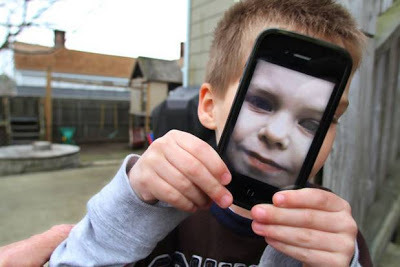
Looking at ourselves...
Journal Photo/Steve Szydlowski
The second-day package includes:
-- Several polls, embedded throughout the main story.
-- First responses to the #eWave series.
-- R.I.-area tech meet-ups.
*****************
-- Part Three, Sunday, May 12.
Safety vs. privacy: New technology a boon to law enforcement, potential threat to civil liberties.
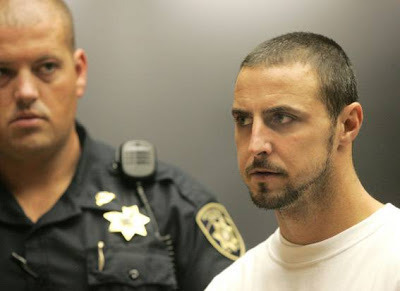
Jason Wayne Pleau at his arraignment for the 2010 murder of David Main during a holdup at a Woonsocket, R.I., bank. Pleau's lawyers asked that his statements to police after his arrest in New York City be thrown out because authorities had zeroed in on his location by tracking his cell-phone’s “pings” off cell sites without a warrant. Journal Photo/Mary Murphy
The second-day package includes:
-- More polls throughout the main story.
-- The debut of our #eModule, a new way to tell stories.
****************
Let me thank my many colleagues at the paper who joined together in true collaboration to conceive this series and bring its debut to fruition -- print, visuals, social-media, online, design, tech people and more, from front-line reporters to editors at the top. Folks, this is journalism in the digital age.
Technology, of course, has profoundly transformed media and the newspaper industry. Below is a montage of how The Journal and long-gone Evening Bulletin were delivered in decades past. I love the biplane, vintage Charles Lindbergh, but have to wonder if it was a Journal promotional stunt...
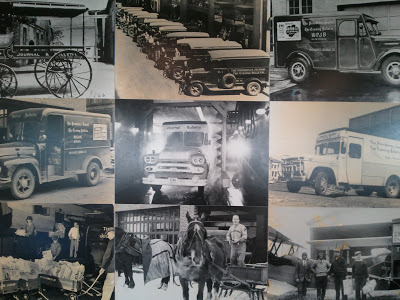
The way the paper used to be delivered. Photo of montage that hangs on Journal cafeteria wall.
Published on April 26, 2013 08:20



